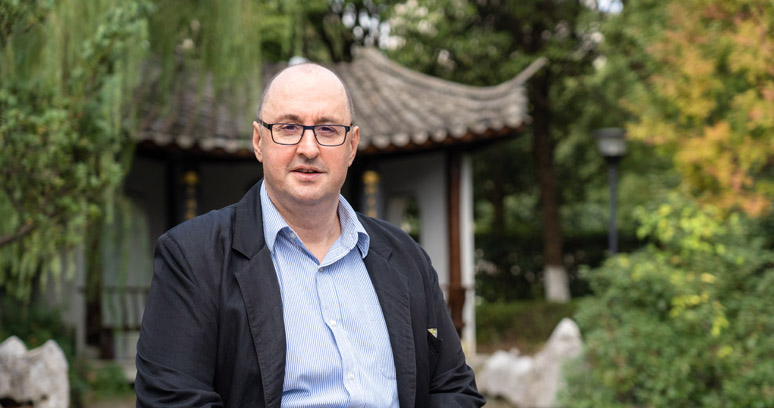
Thomas Hirzel
Telling local stories to the world
Assistant Professor in Digital Humanities and Chinese Studies
Can you explain your research?
I’m a historian and a linguist, and my research mainly focuses on Chinese history and culture, especially the local Ningbo history and its cultural heritage. I conduct my research mainly by analysing primary sources, historical documents created at the time under investigation.
An extraordinarily large amount of primary sources from the Ningbo region are still extant, in particular local gazetteers, which are generally sources providing all kinds of information about a certain place. In the Chinese context the study of local history is therefore closely associated with local gazetteers. Ningbo can be considered as an ideal case for the study of local history because three out of 30 still existing local gazetteers in the whole of China from the Song Dynasty (960-1279) are about Ningbo, and of the 11 local gazetteers existent today from the Yuan Dynasty (1271-1368), two are about Ningbo.
In my research I use an approach that combines textual research with archaeological evidence. Many people know that the Chinese city Jingdezhen is a famous site for the production of Chinese ceramics, while most people don’t know that Ningbo is the home of the main historical site for celadon production. Shanglin Lake, on the tentative list of World Cultural Heritage, was the largest and leading centre for the production of celadon from the late Tang to the early Song dynasties, which fall roughly in the 9th to 11th centuries. These cultural artefacts are important evidence for historical research.
Celadon, a Chinese ceramic with a jade-like colour was one of the most famous and important export commodities from the Ningbo region during that time. By studying the excavated artefacts, for example, the changes to the ornaments of celadon vessel, we can learn a lot about Ningbo's history and culture.
What challenges is your research hoping to tackle?
As a major port city along the Chinese east coast and the Maritime Silk Road, Ningbo has a rich historical past as a global hub of cultural, economic and trading relations. Many primary sources about Ningbo are out there for analysis and interpretation, yet many questions about its past remain unsolved, not to mention that there is very little research literature in English about Ningbo’s history and cultural heritage.
My work is to contribute to fill this gap. By connecting scholars from across the University and the city of Ningbo, I’ve established a Ningbo Studies research group at the University of Nottingham Ningbo China (UNNC). I hope that our interdisciplinary research could help not only preserve Ningbo’s history and culture, but also communicate it to the world.
What specific projects are you doing and what have you achieved so far?
I have two forth-coming papers.
One will be published by the international journal Tang Studies by the end of this month and is on the subject of the history of Ningbo during the Tang Dynasty (618-907). By studying textual and recent archaeological evidence, I found that Sanjiangkou as the administrative center of Eastern Zhejiang was over 400 years older than previously thought. This shows the geographical and economic importance of Ningbo’s Sanjiangkou site and the political stability of the region from the end of the Eastern Jin Dynasty (317 – 420).
In the other paper, I examine the changes of Chinese economic activities along the Maritime Silk Road from 800 to 1200, by focusing on the production and export of Chinese ceramics, mainly celadon. I found that for hundreds of years, Ningbo’s Shanglin Lake was the largest centre for the production of celadon wares in China and vast quantities were exported from the nearby port of Ningbo to countries all over the world along the Maritime Silk Road.
There are other projects currently underway in collaboration with local Ningbo scholars and museums. I’m also working with different University departments to raise the awareness of Ningbo’s unique culture and history among our students and staff. As Associate Director of the Digital Heritage Center at UNNC, I am planning digital and physical exhibitions on Ningbo's history and cultural heritage and there are several more projects and events in the pipeline.
Being a non-native Chinese speaker, you can read and understand texts written in classical Chinese. How did you manage that?
I’m from Germany. Back in Germany, I studied classical Chinese and earned my masters and PhD degrees in Chinese Studies and Philosophy. For my PhD thesis I read and analysed several hundreds of primary source materials, mainly memorials to Chinese emperors but also local gazetteers and others. After teaching Chinese history and classical Chinese for some time, I decided to come to China to live and work in the country and culture that I study, and to further improve my Chinese language skills.
I joined UNNC in 2014 first as a language tutor and in my spare time, I studied for a master's degree in Interpreting and Translation, Mandarin and English. I also worked at the Ningbo Museum as a volunteer docent telling visitors stories about the exhibitions in Chinese. Of course it was not easy, juggling between life, study and work, but seeing the goals accomplished was quite fulfilling. Last year, I was given a Star Volunteer Award by the Ningbo Museum.
Where would you like to take your research next?
Ningbo has a city motto that states “A city of culture, a gateway to the world”. The municipal government is also working to have some historical site, e.g. the Shanglin Lake celadon production site, listed by UNESCO as World Cultural Heritage. I hope that my research can help to build a meaningful cultural narrative about Ningbo and provide a strong support for the UNESCO application.
Going forward, I would like to work more on reproducing cultural heritage using digital technologies, including virtual reality and 3D printing. By working across disciplines with other researchers, we will bring Ningbo's cultural heritage back to life and make it more widely accessible.